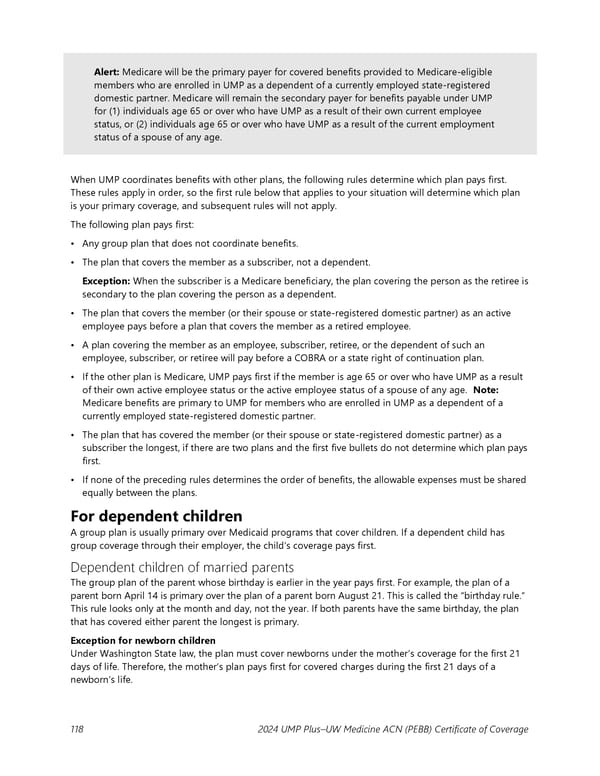Alert: Medicare will be the primary payer for covered benefits provided to Medicare-eligible members who are enrolled in UMP as a dependent of a currently employed state-registered domestic partner. Medicare will remain the secondary payer for benefits payable under UMP for (1) individuals age 65 or over who have UMP as a result of their own current employee status, or (2) individuals age 65 or over who have UMP as a result of the current employment status of a spouse of any age. When UMP coordinates benefits with other plans, the following rules determine which plan pays first. These rules apply in order, so the first rule below that applies to your situation will determine which plan is your primary coverage, and subsequent rules will not apply. The following plan pays first: • Any group plan that does not coordinate benefits. • The plan that covers the member as a subscriber, not a dependent. Exception: When the subscriber is a Medicare beneficiary, the plan covering the person as the retiree is secondary to the plan covering the person as a dependent. • The plan that covers the member (or their spouse or state-registered domestic partner) as an active employee pays before a plan that covers the member as a retired employee. • A plan covering the member as an employee, subscriber, retiree, or the dependent of such an employee, subscriber, or retiree will pay before a COBRA or a state right of continuation plan. • If the other plan is Medicare, UMP pays first if the member is age 65 or over who have UMP as a result of their own active employee status or the active employee status of a spouse of any age. Note: Medicare benefits are primary to UMP for members who are enrolled in UMP as a dependent of a currently employed state-registered domestic partner. • The plan that has covered the member (or their spouse or state-registered domestic partner) as a subscriber the longest, if there are two plans and the first five bullets do not determine which plan pays first. • If none of the preceding rules determines the order of benefits, the allowable expenses must be shared equally between the plans. For dependent children A group plan is usually primary over Medicaid programs that cover children. If a dependent child has group coverage through their employer, the child’s coverage pays first. Dependent children of married parents The group plan of the parent whose birthday is earlier in the year pays first. For example, the plan of a parent born April 14 is primary over the plan of a parent born August 21. This is called the “birthday rule.” This rule looks only at the month and day, not the year. If both parents have the same birthday, the plan that has covered either parent the longest is primary. Exception for newborn children Under Washington State law, the plan must cover newborns under the mother’s coverage for the first 21 days of life. Therefore, the mother’s plan pays first for covered charges during the first 21 days of a newborn’s life. 118 2024 UMP Plus–UW Medicine ACN (PEBB) Certificate of Coverage
 UMP Plus–UW Medicine Accountable Care Network (UW Medicine ACN) COC (2024) Page 118 Page 120
UMP Plus–UW Medicine Accountable Care Network (UW Medicine ACN) COC (2024) Page 118 Page 120